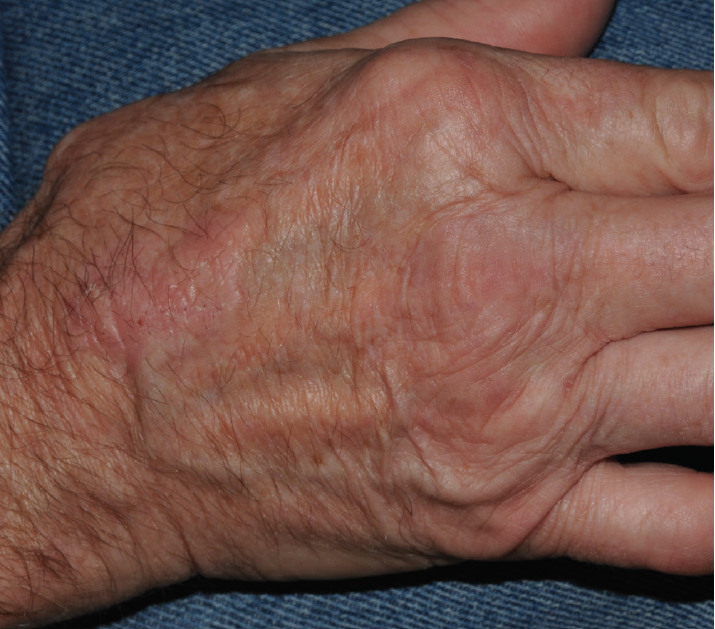Peer Reviewed
What Is the Cause of This Man’s Rash?
Author:
David L. Kaplan, MD—Series Editor
Citation:
Kaplan DL. What is the cause of this man’s rash? Consultant. 2017;57(5):306-307.
This 68-year-old man presented with a 6-month history of an itchy rash on the dorsal and palmar aspects of both hands. He denied any exposure history or having a rash elsewhere on his body. There had been no changes in his medications.


Answer on next page
Answer: Psoriasis
Psoriasis is responsible for this rash. The clue to the psoriasis diagnosis is the enlarged metacarpophalangeal joint on the patient’s index finger—he had psoriatic arthritis that had not been diagnosed.


Psoriasis affects 2% to 3% of the population, and the estimated prevalence of psoriatic arthritis among these individuals is from 4% to 30%. Moreover, an estimated 10% to 55% of all patients with psoriasis have psoriatic nail disease. This means that approximately 7 million people in the United States have psoriasis, with from 150,000 to 260,000 new cases of psoriasis being diagnosed each year.
The pathogenesis of this disease is not completely understood. The epidermis is infiltrated by a large number of activated T cells, which appear to be capable of inducing keratinocyte proliferation. This is thought to contribute to an ensuing deregulated inflammatory process, with a large production of various cytokines.1
A systematic review of 90 studies confirmed that patients with psoriasis had a higher risk of ischemic heart disease, stroke, and peripheral arterial disease but also had a greater prevalence of risk factors for cardiovascular disease compared with control subjects.2 The dose-response relation between uncontrolled hypertension and psoriasis severity remained significant after adjustment for age, sex, body mass index, smoking status, alcohol use, comorbid conditions, and current use of antihypertensive medications. A greatly increased risk of chronic kidney disease was also associated with increasing severity of psoriasis.
While all 3 of the patients described here were initially treated with topical therapy, the concern as to whether psoriasis is a marker for increased morbidity and mortality due to systemic inflammatory mediators continues to be investigated.
David L. Kaplan, MD, is a clinical assistant professor of dermatology at the University of Missouri–Kansas City School of Medicine in Kansas City, Missouri, and at the University of Kansas School of Medicine in Kansas City, Kansas. He practices adult and pediatric dermatology in Overland Park, Kansas.
REFERENCES:
- Meffert J. Psoriasis. Medscape. http://emedicine.medscape.com/article/1943419-overview. Updated February 17, 2017. Accessed March 28, 2017.
- Patel RV, Shelling ML, Prodanovich S, Federman DG, Kirsner RS. Psoriasis and vascular disease-risk factors and outcomes: a systematic review of the literature. J Gen Intern Med. 2011;26(9):1036-1049.


